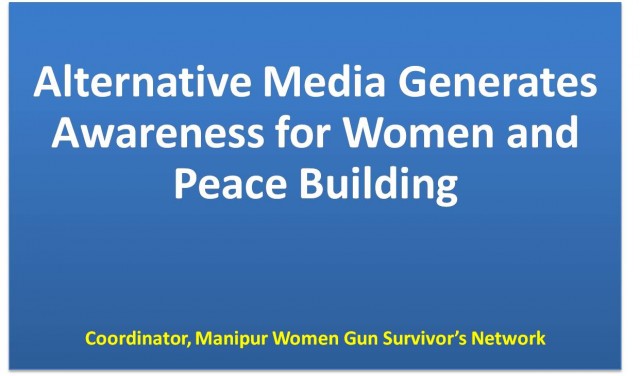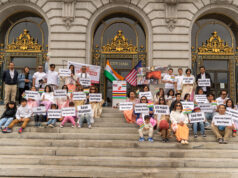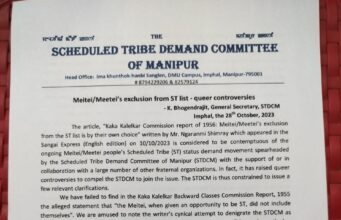In a socio-political climate that remains fragile and unpredictable, Imphal is doing all of Manipur proud by hosting a 6 day interactive ‘Grassroots Comics and Wall Newspaper Workshop’organized by the Control Arms Foundation of India (CAFI) in partnership with the Manipur Women Gun Survivor’s Network and World Comics India.
This workshop is part of ‘Empowering Women for Peace and Development in South Asia’ (EWPDSA), a project supported by the EU and Welthungerhilfe (with implementing partners CAFI and Anando); enabling the active participation of women in decision making and peace building processes across conflict riddled parts of North East India, Myanmar and the Chittagong Hill Tracts of Bangladesh.
The methodologies intrinsic to this training straddle both realms of creative self-expression and issues based activism. Sharad Sharma, the founder of World Comics India andchief proponent of this uniquely transformative methodology, leads the facilitation processes. He originated this alternative media model in the late 90s – elevating awareness building,levels of participation and impact in the process.The movement has grown since and is embraced the world over.
“The Grassroot Comic Workshop was done in an attempt by our organisation Manipur Women Gun Survivors Network and Control Arms Foundation of India to engage arts for healing in conflict ridden sates of Manipur and other parts of Northeast India and to ensure that women are involved in all forms of peace process which is missing at the moment.The sketches by the women in this workshop are a path towards healing in Manipur and Northeast Region.”
Sharad predicates his beliefs on the fact that“everyone can draw” and “everyone has an important story to tell”.“How well you draw is unimportant. How safe you feel in reconnecting with the parts of you that want to draw – that want to truthfully tell your story- that speak to the issues you care about as a citizen – is important. Exploring that freely and making a space for it is key.”
The tools grassroots comics employ are simple and affordable. Basic techniques, inexpensive stationery (pen, paper, pencil, eraser, photocopies) and the ability to generate powerful messages from one’s experiences are the essentials beingworked with. The idea that ownership of content vests with individuals and the messages they want to convey (the issues they want to build value for) is defining of this medium.
As the workshop progresses participants essentially rediscover the freedom to draw, playing with a few basic techniques and identifying issues they care about. They share personal stories connected with the overarching theme of conflict and resilience. They begin developing a fifteen line story from their lives (or from experiences they were influenced by), and learn to break their narrative down into 4 visual panels. They create their individual posters in pencil after running their content by peers and getting technical inputs from facilitators. Eventually they ink out their own 4 panel stories, making their message clear in graphic form – a medium with the capacity to connect on immediate and visceral levels.
The final segment of the workshop will have participants learning how to create a ‘wall newspaper’ – a community newspaper made with chart paper, recording important pieces of local news, interviews, photographs, collective and meaningful action taken in the community –told from a rights based and gender just perspective.
So far the posters created by the participants present have explored a range of interconnected themes: justice for encounter killings, the struggles experienced by women survivors of conflict, the ill effects of ‘bandhs’ on everyday life, the ugliness surrounding dowry deaths, the slippery slope encountered when labelling youth, stories of how violence begets violence, stories of sexual and gender based exploitation , the dangers of mob- justice and brute force on the part of the police, the leadership role that women can play in providing psycho-social support and spreading rights based information.
“What is beautiful about these methods is that those who learn how to use them are equipped to share them with others. It travels. I am excited to be in a position to take this into a local school, upon completion of this training” says Singamayum ongbi Mumtaz Begum, one of the participants who is a survivor of conflict and believes in the resilience of the human spirit.
The Wall Poster Comics and Wall Newspapers generated by this workshop will culminate in a campaign where they will be pasted in villages, bus stops, shops, schools and notice boards. Generating local interest and organically bridging the gap between those drawing the posters and those reading them makes this an immensely relatable, versatile and successfulcommunication tool.
The 25 participants who have taken time out of their demanding schedules to attend a 6 day intensive training, come from different villages across Manipur. They represent, women, men, youth, activists, teachers, grass roots leaders and social workers. They are individuals brought together by their active interest in peace building – many of them survivors of conflict. Combining their experiences with the freedom to draw – to make their point in a way that invites dialogue, engagement and connection – is the skill they are here to acquire.
Ima Lourembam Nganbi, is a participant and a locally revered Meira Paibi. She played a crucial role in bringing visibility to the oppression shrouding the rape and consequent death of Manorama Devi in 2004. Her poster is a visual depiction of the moment she found the courage to take a stand against the brutality on the part of the army in that particular context. She is proud of her poster and what it represents to her. “I will share this technique with other women leaders. There are so many stories waiting to be told, so many moving narratives. We need to document our courage this way.”
Grassroots comics are democratizing the media in ways that make it possible for voices on the ground to be distinctly heard. They are both art and activism – a set of interactive communication tools that transcends the barriers of language, ethnicity, religion, gender, education and access. “They are agency in the hands of the people. Individuals and communities working on issues they care about have an avenue for expression that is entirely theirs to shape. This builds confidence and inspires dialogue in ways that only unalloyed self-expression and unencumbered sharing have the power to do” observes Neha Naq vi of Welthungerhilfe India.
The workshop will culminate with an exhibition at the University of Manipur where students of mass communications will interact with newly minted ‘comics-journalists and trainers’ between 10:30 am and 12:30 pm on Monday the 18th of July 2016.
Submitted by Reena Mutum (Coordinator) and Omita Sharungbam
(Programme Assistant), Manipur Women Gun Survivor’s Network












